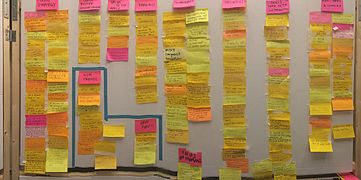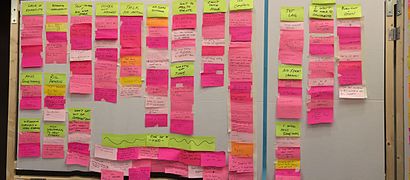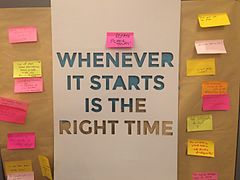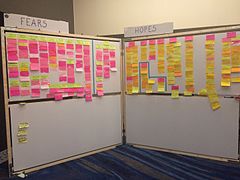ועידת ויקימדיה 2017/תיעוד/מסלול התהליך האסטרטגי/יום 1
| WMCON 2017 | Core Conference Program | Fringe Events | Registration & Participants |
Location |
Logistics |
Contact |
Documentation, Reports, Reviews |
המורכבות של תנועה
הגיוון של הקבוצה
גיוון הקבוצה הודגש באמצעות סדרה של פעילויות "סוציומטריות", שבהן התבקשו המשתתפים למקם את עצמם על פי פרמטרים וקריטריונים דמוגרפיים. למרות שמדובר בפעילות התנדבותית, הממתעדים תיארו את הפעילויות האלו כ"הזמנה למתוח את הגוף ואת המחשבה שלנו", תוך מודעות מלאה לכך שאנשים מסוימים לא ירגישו בנוח עם סוג כזה של אינטראקציה.
במסגרת ההקדמה, המנחים הזכירו למשתתפים כי קבוצה זו מייצגת רק חלק קטן מכלל הוויקימדים, וכי רבים אחרים לא יכלו להשתתף בה. כשהתבקשו לציין מי לדוגמה נעדר, המשתתפים נקבו בהומור בשמות כמו אובמה, ג'ימי או רורי, הקמע.
כשנשאלו על המורכבות של תנועת ויקימדיה, רוב המשתתפים הרימו את ידם בהסכמה לכל שוויקימדיה "מורכבת, אבל בסופו של דבר זה דבר הגיוני". כמות שווה של ידיים תמכה ברעיון שוויקימדיה "בלתי אפשרית", או מצד שני "קלה להבנה".
גאוגרפיה
על מנת לקבל תחושה בנוגע לתפוצה הגאוגרפית בתוך הקבוצה, המשתתפים התבקשו לדמות את מפת העולם בחדר. שאלות והערות ממשתתפים המבקשים אוריינטציה וקווי אורך המחישו את התרבות מבוססת-המידע של הקבוצה.
לאחר סיבוב הערות, הוזמנו המשתתפים לחלוק עם שכניהם סיפור אישי הממחיש מדוע הם מרגישים השראה לתרום לוויקימדיה.
שפות
הסיווג השני היה על פי שפה. המשתתפים התבקשו להתקבץ בהתאם לשפה בה הם הכי מרגישים בנוח לדבר. ברחבי החדר, מספר אנשים תיארו, בשפות שונות, מדוע הם היו בכנס, או ביטאו משהו שהם היו רוצים לומר על ויקימדיה בשפת האם שלהם. להלן כמה דוגמאות להצהרות המתורגמות לאנגלית:
- באוקראינית - "אני הוזמנתי לכאן."
- בהינדי - "תודה לכם על שנתתם לנו הזדמנות לייצג את הודו על גבי המפה הגלובלית."
- באיגבו (שפה דרום-מזרח אפריקאית המדוברת בניגריה) - "בוויקיפדיה אתה יכול למצוא כמעט כל דבר שאתה רוצה לדעת על העולם."
- ביורובה (שפה נוספת המדוברת בניגריה) - "ויקיפדיה היא המקום שבו אתה יכול למצוא את הנשמה של כל הידע האנושי."
תמונות של תנועת ויקימדיה
פסלים אנושיים: אתגר בובות הראווה
לאחר מכן, המנחים הציעו כי המשתתפים ייענו לאתגר בובות הראווה. ההוראות היו פשוטות: בקבוצות של חמישה, יש ליצור "פסל אנושי" משותף (או תרחיש קפוא) המייצג את ויקימדיה, ולהישאר במיקום הזה במשך דקה בערך, בעוד המצלמה מצלמת את החדר.
סימולציה של מערכת חיים (או אימון משולש)
הפעילות התנועתית האחרונה במסגרת הפגישה ביקשה מתת-קבוצה של המשתתפים בחדר להדגים מה קורה בתוך מערכת חיים, בעוד שאר הקבוצה יצרו מעגל גדול סביב הסימולציה והתבוננו. הסימולציה התרחשה לפי הוראה פשוטה מאוד: על כל משתתף לזהות שני זרים בקהל המשתתפים, ולאחר מכן לנסות ליצור משולש שווה צלעות אתם, ללא ידיעת האחרים.

המנחים ביקשו מהקבוצה לציין מה הם רואים, ואילו אסוציאציות התקשרו מבחינתם לתנועת ויקימדיה על בסיס פעילות זו. להלן כמה הערות של המשתתפים.
- משתתף: -- “אנחנו כמו תנועה בראונית.”
- מנחה: -- “מה זה?”
- משתתף: -- “תבדוק בוויקיפדיה!”
- [צחוק קבוצתי]
- “זה לא יכול להפסיק לזוז.”
- “There is no solution. Equilibrium is highly improbable. You always have to move.”
- “Someone will be disappointed for not being in a triangle.”
- “Everything is interconnected.”
- “However we explore trajectories there will always be gaps.”
- “There are differences in our personalities.”
- “We did not all pick the same people.”
- “Taking other people’s agendas into account, even if you had to follow your own agenda too.”
- “You don’t always realise how many people are dependent on your position. You always have some form of invisible power.”
- “People trying to control what was happening and being completely unsuccessful. Sort of like Wikimedia…”
- “I saw two strategies: forming large triangles and small triangles” - a space for the small initiatives and the big initiatives
- “Lots of isosceles and acute triangles” -- initiates don’t always take the shape we expected
- “Dynamic chaos. When one moves, the others move.”
- “Feeling like running after someone that was running away from me.”
- “We were dancing a little”
- “Feeling more interested in who wanted to create a triangle”
- “Using gestures to let others know who they were connected to.” - Emerging cooperation to control the pattern
Hopes, Fears and Something Else
Each participant was asked to write a hope (yellow or orange sticky) and a fear (pink sticky), which were attached to a wall and then roughly clustered. Below are the different clusters, where the number associated with each cluster refers to the amount of stickies that were grouped under that title. There are also a few example statements from participants below.
- You can see here a set of photos in order to read some of the statements more in detail.
-
תקוות (1)
-
תקוות (2)
-
חששות (1)
-
חששות (2)
-
דבר נוסף (1)
-
דבר נוסף (2)
-
דבר נוסף (3)
-
כלל ההערות (מקובצות)
תקוות
|
מקצועי
|
Personal
|
Something else…
|
חששות
|
מקצועי
|
Personal
|
Something else…(15)
|
Analysis of Present Situation
Movement Strategy: Building the Foundation
The core strategy team, involved in facilitating the Movement Strategy track, offered an overview of the process leading towards the final strategy, and shared an analysis of the trends in Wikimedia and the world that will have a strong impact on the movement’s future. All slides used in the presentation are available to download. The team members leading the presentation were:
- Ed Bland (Strategy Consultant, Williamsworks)
- Guillaume Paumier (Senior Analyst, Wikimedia Foundation)
- Suzie Nussel (Organizational strategy consultant, Wikimedia Foundation)
- Adele Vrana (Director of Strategic Partnerships, Global Reach, Wikimedia Foundation)
Introduction
- Analysis of movements, where they get stuck and what can be done
- New information for some, maybe a different spin for those who are familiar
Where are we today?
- Purpose of presentation the basic/foundational information for anyone thinking about the future of Wikimedia
- Humbling numbers of users (growth of Wikimedia)
- הצגה של המסלול האסטרטגי
מגמות חיצוניות (עולם)
= אוכלוסייה
בין שנת 2015 לשנת 2030, עיקר הגידול באוכלוסיית העולם יבוא לידי ביטוי באפריקה (42%) ובאסיה (12%).
- גישה לא שיוויונית למשאבים
- There are improvements on literacy
- NODEADLINE is a privilege
חינוך
While overall literacy will rise, global access to post-secondary education will remain out of reach for billions of people.
טכנולוגיה
For the first time, nearly everyone in the world will have a smartphone -- with internet and a camera. An exponential use of social media over the past few years.
הפוליטיקה של הידע
Much of the world’s digital knowledge is generated by only a fraction of the world’s population. As more people come online, addressing representation will be even more urgent.
מגמות פנימיות (ויקימדיה)
הטיות
- Asia has 60% of world population, 6% of monthly edits; Europe 11% of world population, 53% of monthly edits
- This should not be problem - Wikimedia aspires to cover the whole world, so we have a long way to go. Gender gap is also a concern.
מספר העורכים
- Peak editors in 2007 and then a progressive decline with great fluctuations
- הרבה אנשים שמגיעים לוויקיפדיה לא נשארים - אנחנו מפסידים אנשים
מדוע אנשים עורכים?
- אנשים רבים לא מפרטים את הסיבה האמיתית בגללה הם עורכים
- You’d think people are driven by personal interest, but it’s actually the contribution to a social mission that motivates them
Organisation of Wikimedia
- User groups have been growing most rapidly
תורמים
- מרבית התורמים הם מארצות הברית ומהאיחוד האירופי
- Donors give to Wikimedia because they use it and to see it as a worthwhile resource; because they know Wikipedia depends on donations as a nonprofit
Top reasons why people use Wikipedia?
- Topic is referenced in the media
- עניין בלמידה
- Came up in conversation
Countries where Wikimedia is not known or popular[1]
- Research happening in Mexico, Nigeria, India, Brazil and Indonesia to understand low readership and lack of awareness of Wikipedia.
- Start with phone surveys in countries where people are starting to use internet from their mobile phones.
- In Nigeria, internet access has been prohibitively expensive. Consumers are savvy, price-sensitive shoppers with low brand loyalty.
- בהודו, הגישה לאינטרנט היא יותר ברת-השגה, אבל העלות עודנה מהווה מחסום בפני התפשטות רחבה יותר לקהלים חדשים.
- Next countries being surveyed are Brazil and Indonesia - access is very expensive so people want to go online, download information, and then look offline - so offline functionality is important.
- As a brand, Wikipedia is not widely recognized or understood. Some people are Wikipedia readers without realizing it. Recent survey in Iraq - only 15% of respondents knew what Wikipedia was.
Developing partnerships
- Educators and students contribute to Wikipedia so students gain exposure to our work and become early contributors.
- Cultural institutions share their resources with the world through collaborative projects, in order to expose people to cultural archives that they couldn’t otherwise access.
- Industry partners increase access to Wikipedia globally, such as telecommunication companies waiving data charges, to overcome obstacles blocking potential readers.
- Partner organizations join us in our quest for free and open knowledge, helping to strengthen the political and legal framework for free knowledge and education.
Ecosystem
- Some of the other actors in the ‘free knowledge’ ecosystem will be our friends or frenemies.
Who do we want to become?
We can recognise a lot of different movements (e.g. the civil rights movement, the microfinance movement, the environmental conservation movement). There is much reluctance in considering Wikimedia a ‘movement’ because it is not inherently a social or a political movement; however, there are are characteristics that would define Wikimedia as a ‘movement’:
| The Wikimedia community | Other movements also |
|
|
Questions and Comments from Audience
Q. = Question / A. = Answer / C. = Comment
- Q. Data is very United States/Europe focused. Is there other data available?
- Q. Is there any info about the distribution of funds collected through Chapters? - A. Adele: This map can be built because information is available on Wiki.
- Q. Should we invest in partnerships for offline access, when cell-phone costs in countries that are now expensive are likely to drop in the next 20 years?
- C. There are many means of contribution we disregard beyond editing - redefining contribution may be useful to how we define the movement.
- Q. What’s the role of the machines in the future? In the future we might expect more contribution from machines? How do we address that?
- C. We didn’t hear anything about what information people will need in their lives in the future (like 2030).
- Q. You can see the data is mostly focused in Northern part of the globe. How can we decide where to go, if we don’t know what is going on elsewhere? How come we don’t know what is going on with our own projects in other regions? Data needs to be more representative of the whole movement. [clicks and applause to represent agreement]
- C. No discussion of movement culture. We have a culture, we probably want to look closely at that culture.
- C. About the circle of editors in the ecosystem map: no editors, means no readers, no chapters - and yet they were represented with the same size as ‘donors’ in the map.
- C. Japan: people who contribute to Wikimedia projects are not the same people interested in the Wikimedia movement.
- C. India: confirms the predictions on the four dimensions shown in presentation.
- C. Missing how knowledge is shared between people: knowledge graph, Quora, social media projects. How are these connected to the strength of Wikimedia projects? How can we connect reliability of sources and facts of Wikimedia products, with the way people share knowledge now and in the future?
- Q. “We went down ‘Rabbit Hole’: New user retention” - what makes new users happy is what drives off established editors
- C. Organisations that are involved with local communities and education - maybe these require more coordination at international level.
- C. Concern that people might go to English content because of the volume of information and possibilities, but then reflected that it isn’t a matter of competition between languages. You can have access to information in your home language that is more accurate and contextualised and in English, for a more global outlook on the same data.
Personalising the Present Situation
‘Wave’ trends analysis model
Participants used the Wave Trends Analysis model[2] which builds on the metaphor of a wave to bring out the landscape of issues and opportunities that need to be considered when thinking about the future of Wikimedia.
The wave model identifies four types of trends:
| What is emerging?
...beginning to build ...gaining energy ...showing signs of growth ...exciting and showing potential |
What is established?
...producing the best results ...creativity and energy starting to reduce ...stable but opportunity for growth limited ...future trends could challenge position |
| What is ending?
...no longer working well ...unclear where to go next ...losing energy, confusing ...dying, being replaced |
What is undercurrent?[3]
...hidden challenges ...the ‘elephant in the room’ …feeling the effect but not clear what it is |
Participants used the model to discuss and identify internal and external trends that need to be considered. The results are below. Click on each segment to access a larger picture.
| INTERNAL | EXTERNAL | ||||

|

|

|

|

|

|

|

|

|

|

|

|
A high-level analysis of the participant’s contributions shows the greatest amount of input was categorised under ‘emerging’ trends, less under ‘established’ and even less under ‘ending’, on both internal and external.
As external trends, participants repeatedly mentioned the ‘post-fact society’ and populist discourse as the most relevant emerging trend. This was followed by changes in demographics, namely the growth of population and dealing with social differences, as well as technological developments like machine learning and virtual reality. Social media and use of internet via mobile devices were mentioned as an important established trend, and as ending trends, several people mentioned trust - in media, in experts, in capitalism.
Under internal trends, a great number of inputs mentioned automation as well as addressing bias and fostering inclusion within Wikimedia as important emerging trends. Established internal trends included topics like partnerships (GLAM and others), communication between Wikimedians, and the way content is processed (especially deleted).
Issues & Opportunities: Participant-led discussions
The first round of the participant-led discussions took place on Friday afternoon. For space and rationality issues, the results of this first round are shown together with the results of the second and third round on the DAY 2 page.
Notes
- ↑ The original research can be found on Research:Index
- ↑ Bill Staples - Transformational Strategy: Facilitation of ToP Participatory Planning
- ↑ The ‘Undercurrent’ dimension was requested by participant in order to explore characteristics that may not fit into any of the three first categories. This category is part of the original wave trends model, which was adapted for the purposed of this activity.



















